Are you ready to embark on a journey that will open your eyes, challenge your beliefs, and create lasting memories? Traveling is not just about visiting new places; it’s an opportunity to explore the very fabric of our world. But before you set off on your grand adventure, it’s important to be well-prepared. From packing strategies to navigating language barriers, from avoiding tourist traps to immersing yourself in local traditions, there’s a lot to consider.
So, how can you ensure that your travels are smooth, enjoyable, and truly transformative? In this article, we will provide you with essential travel tips that will guide you towards unlocking the incredible experiences that await you. Get ready to dive deep into the world of travel and discover the secrets to becoming a savvy globetrotter.
Key Takeaways:
- Preparation is key: Research your destinations, plan ahead, and be equipped with the necessary travel documents.
- Travel smart: Pack strategically, opt for travel insurance, and make informed financial decisions.
- Plan your itinerary and make bookings in advance to make the most of your trip.
- Choose your accommodations wisely: Look for sustainable options and maximize hotel rewards.
- Pack smart: Bring essential items and pack efficiently to make your journey hassle-free.
Preparing for Your Journey
Securing Your Travel Documents
Before embarking on your adventure, it’s crucial to ensure that you have all the necessary travel documents in order. Take the time to check the requirements for your specific destination, including passports, visas, and any other identification or permits that may be needed.
Make copies of your important documents and store them separately from the originals. This way, if your documents are lost or stolen, you’ll have a backup copy to expedite the replacement process.
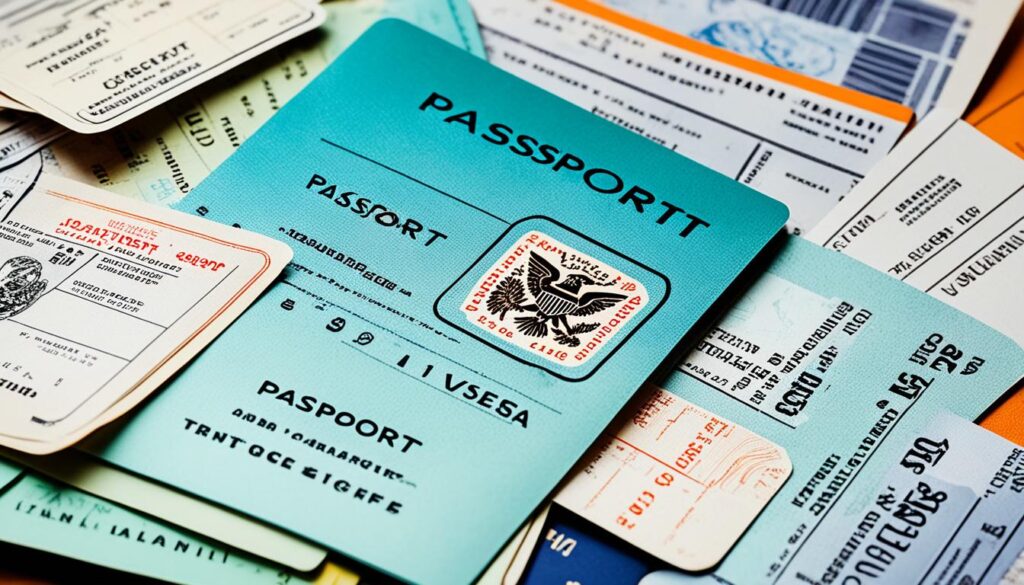
Packing Strategically for All Destinations
When it comes to packing for your journey, it’s all about strategy. Start by making a detailed packing list to help you stay organized and ensure you don’t forget any essentials. Consider the climate and activities of your destination and pack accordingly.
Rolling your clothes instead of folding them can save space and prevent wrinkles. Use packing cubes or compression bags to maximize space in your luggage. Pack versatile clothing items that can be mixed and matched to create different outfits.
Don’t forget to leave room for souvenirs and other items you may acquire during your travels. And remember, less is more when it comes to packing. Aim to pack light and only bring what you truly need.
Opting for Travel Insurance
Travel insurance is an important aspect of preparing for your journey. It provides financial protection and peace of mind in case of unexpected events such as trip cancellations, medical emergencies, or lost baggage.
When choosing a travel insurance policy, carefully review the coverage and exclusions. Consider factors such as medical coverage, trip cancellation/interruption coverage, and emergency medical evacuation. It’s also important to check if your health insurance covers international travel.
Remember that travel insurance can save you from significant financial burdens and provide assistance in times of need, so it’s worth investing in before you embark on your journey.
Financial Savvy on the Go
When it comes to traveling, being financially savvy can make a big difference in ensuring a smooth and budget-friendly journey. In this section, we will explore some valuable financial tips to help you make the most of your travel experience.
Choosing the Right Credit Card for International Travel
One of the essential aspects of financial planning for travel is selecting the right credit card. Look for a card that offers travel perks, such as no foreign transaction fees and travel rewards. These rewards can earn you points, miles, or cashback, which can be beneficial for future trips. Additionally, make sure to check if your credit card provider offers travel insurance coverage, providing you with peace of mind during your adventures.
Understanding Currency Exchange
Currency exchange can be a confusing and costly aspect of international travel. To avoid excessive fees, it’s important to research the current exchange rates and compare the rates offered by various exchange services. Consider using local ATMs for cash withdrawals, as they often provide better rates than currency exchange kiosks. Additionally, notify your bank and credit card company of your travel plans to avoid any unexpected card blocks or fraud alerts.
Budgeting Tips for Various Destinations
Creating a realistic budget for your travel plans is crucial for managing your expenses effectively. Research the cost of living, accommodation, transportation, and activities in your chosen destinations. Take advantage of budgeting apps and tools to track your expenses and avoid overspending. Consider opting for affordable accommodations, trying local street food, and exploring free or low-cost attractions to stretch your budget further.
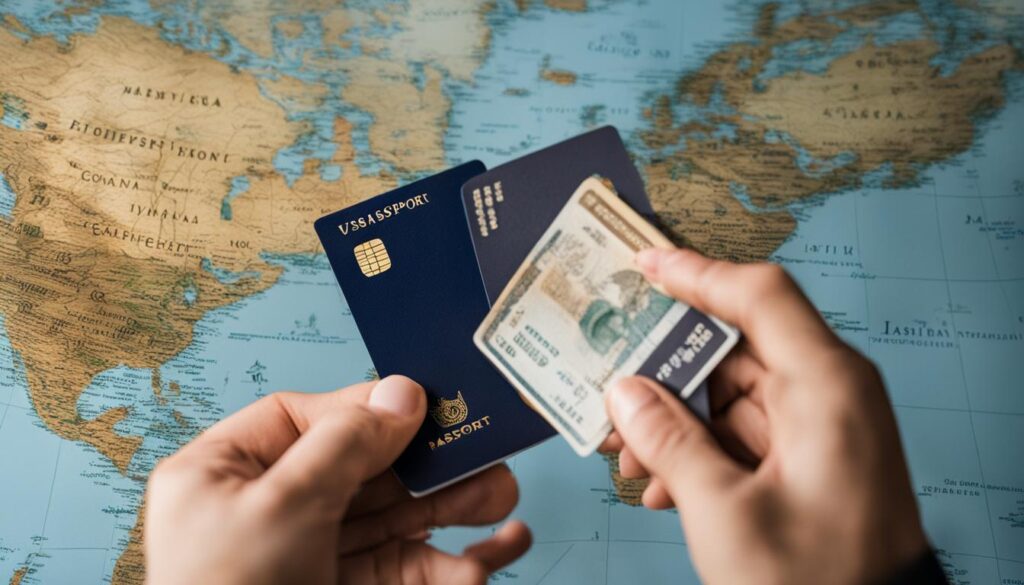
| Destination | Average Daily Budget |
|---|---|
| Paris, France | $100-$150 |
| Bangkok, Thailand | $30-$50 |
| Rome, Italy | $80-$120 |
| Bali, Indonesia | $40-$60 |
Table: Average daily budget for various destinations (in USD)
By following these financial savvy tips, you can optimize your travel expenses, make smart financial decisions, and ensure a more enjoyable and worry-free trip.
Travel Itineraries and Bookings
Planning your travel itinerary and making bookings is an exciting part of the travel planning process. It allows you to customize your journey, choose destinations, and select activities that align with your interests and preferences. Here are some tips to help you create a well-rounded itinerary and make efficient and cost-effective travel bookings:
- Research and choose destinations: Start by researching different destinations and identifying the ones that resonate with you. Consider factors such as cultural attractions, natural landmarks, historical sites, and unique experiences.
- Select transportation options: Once you have decided on your destinations, explore different transportation options such as flights, trains, buses, and ferries. Compare prices, schedules, and travel times to find the most convenient and budget-friendly options.
- Plan activities and attractions: Research and make a list of the must-see activities and attractions in each destination. Prioritize based on your interests and allocate sufficient time for each activity. Consider booking tickets in advance for popular attractions to avoid long queues.
- Book accommodations: Look for accommodations that suit your budget, preferences, and location preferences. Consider factors such as proximity to attractions, safety, amenities, and reviews from previous guests. Book accommodations well in advance, especially during peak travel seasons.
- Consider guided tours: If you want to explore your destinations more comprehensively or prefer a hassle-free experience, consider booking guided tours. They provide insights, convenience, and the expertise of local guides to enhance your travel experience.
Creating a travel itinerary and making bookings requires careful planning and consideration. Use these tips to ensure a smooth and enjoyable journey filled with unforgettable experiences. Happy travels!
“Travel is the only thing you can buy that makes you richer.” – Unknown
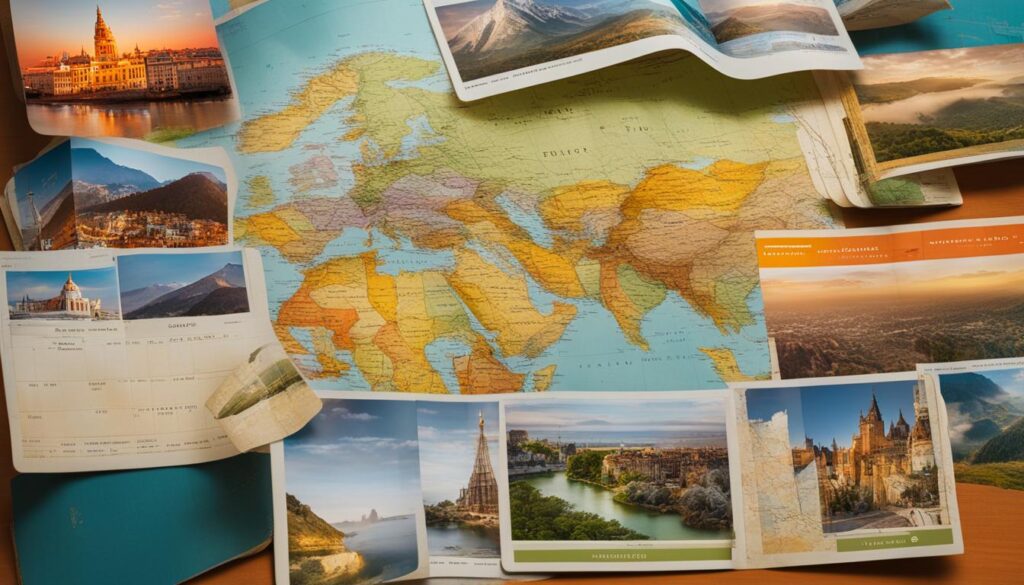
Accommodation: Comfort Meets Convenience
When traveling, finding the perfect accommodation to enhance your overall experience is crucial. Not only do you want comfort, but also convenience that caters to your needs. In this section, we’ll explore two key aspects of accommodation that can elevate your travel experience: sustainability and hotel rewards.
Finding Sustainable Places to Stay
As responsible travelers, it is important to consider the environmental and social impact of our accommodation choices. Sustainable travel is an emerging trend that focuses on minimizing our carbon footprint and supporting local communities.
When searching for eco-friendly and socially responsible places to stay, look for accommodations that prioritize sustainability practices such as energy efficiency, waste reduction, and use of renewable resources. Many hotels and resorts now offer eco-certifications to showcase their commitment to sustainable practices.
Additionally, consider staying in accommodations that support local communities by employing local staff, sourcing local products, and giving back through community initiatives. By choosing these types of accommodations, you can contribute positively to the destinations you visit and support the preservation of their natural and cultural heritage.

Maximizing Hotel Rewards and Points
While sustainability is important, it doesn’t mean you have to miss out on the benefits of hotel rewards programs. These programs can help you maximize your travel experience and make your stays even more rewarding.
Joining a hotel rewards program allows you to earn points for each stay, which can then be redeemed for various benefits such as room upgrades, complimentary meals, spa treatments, or even free nights. Some programs also offer exclusive experiences and partnerships with airlines or other travel-related brands.
To make the most of your hotel rewards, consider focusing your stays at hotels within a specific chain or brand. This way, you can accumulate points faster and enjoy more benefits. It’s also worth exploring credit cards that offer hotel rewards and bonus points for bookings, enhancing your earning potential.
Before booking, compare the different hotel rewards programs available and choose one that aligns with your travel preferences and offers the most value for your loyalty.
By considering sustainability and hotel rewards when choosing accommodation, you can ensure that your travel experience is not only comfortable and convenient, but also environmentally and socially responsible. So, whether you’re staying at a boutique hotel committed to sustainable practices or earning points for your future stays, make every accommodation choice count!
Smart Packing: Essentials for Every Trip
When it comes to travel, packing efficiently can make all the difference. Smart packing not only ensures that you have everything you need for your trip, but it also saves you time, energy, and the frustration of lugging around unnecessary items. So, what are the essential travel items that should be in every traveler’s suitcase? Let’s take a look.
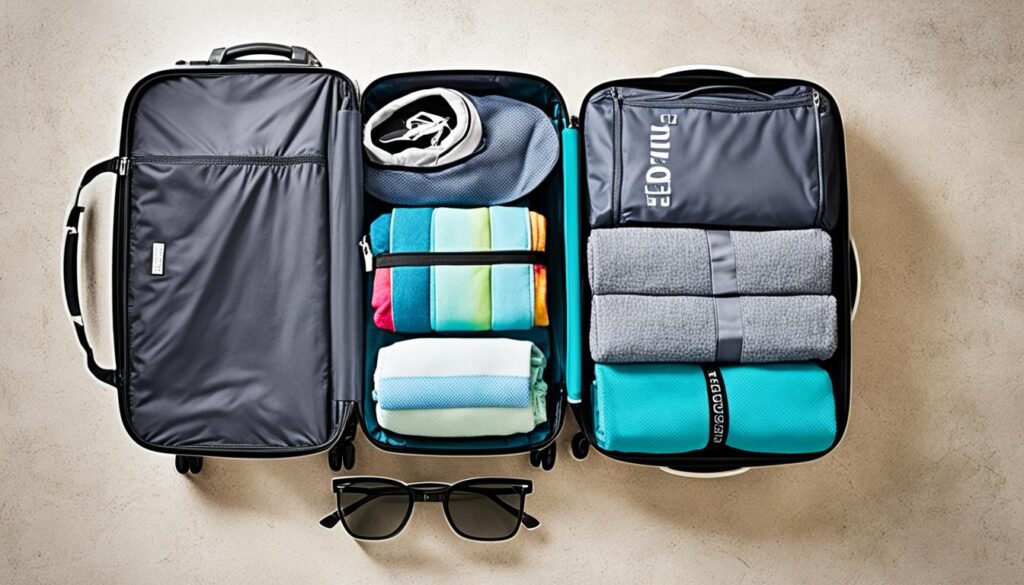
Packing Essentials: Versatility is Key
When selecting what to pack, focus on versatile items that can be mixed and matched to create multiple outfits. This way, you can pack light while still having a variety of clothing options. Opt for basics like neutral-colored tops, bottoms, and dresses, as well as lightweight layers that can be easily added or removed depending on the weather. Don’t forget to pack comfortable shoes that are suitable for various activities.
In addition to clothing, there are several other essentials that should make their way into your suitcase. These include:
- A sturdy and lightweight suitcase or backpack
- Travel-sized toiletries and personal care items
- A first aid kit with essential medications
- Travel adapter and chargers for your electronic devices
- Reusable water bottle to stay hydrated
- A compact travel umbrella
- Travel-sized laundry detergent for longer trips
Packing Efficiently: Tips for Making the Most of Limited Space
Now that you know what to pack, it’s important to pack efficiently to maximize the limited space in your suitcase or backpack. Here are some tips to help you pack smart:
- Roll your clothes instead of folding them to save space and minimize wrinkles.
- Use packing cubes or compression bags to organize and compact your belongings.
- Place heavy items at the bottom of your suitcase to distribute weight evenly.
- Utilize empty spaces, such as the insides of shoes, to store small items.
- Minimize the amount of bulky toiletries by opting for travel-sized containers or solid alternatives.
- Wear your bulkier clothing items and accessories, such as jackets or hats, instead of packing them.
By implementing these packing strategies, you’ll be amazed at how much you can fit into your luggage without sacrificing style or comfort.
Lastly, don’t forget to pack any essential travel accessories that suit your specific needs. These may include a neck pillow, noise-cancelling headphones, a travel lock, a luggage tag, or a portable charger. These small but mighty items can greatly enhance your travel experience.
Eating and Drinking Safely Abroad
Navigating Dietary Restrictions in New Cuisines
Exploring new cuisines is one of the most exciting aspects of traveling. However, if you have dietary restrictions, it’s essential to plan ahead to ensure you can enjoy your meals safely. Research the local cuisine and familiarize yourself with common ingredients and preparation methods. Communication is key when dining out, so don’t hesitate to ask questions or request modifications to accommodate your needs. You can also carry a translation card that explains your dietary restrictions in the local language to facilitate clear communication.
Avoiding Common Food and Water Pitfalls
When traveling, it’s important to be mindful of the food and water you consume to avoid any adverse health effects. Stick to reputable establishments that prioritize food safety and hygiene. Look for clean cooking environments, fresh ingredients, and restaurants with high customer ratings. Additionally, opt for cooked foods that are served hot, as they are less likely to contain harmful bacteria. As for beverages, choose bottled water or beverages that have been properly sealed. Avoid consuming tap water, ice cubes, and drinks from street vendors unless you are confident in their quality.

Remember, each destination may have its own unique challenges, so stay informed about any specific food and water safety guidelines for the country you are visiting. By being cautious and proactive, you can enjoy the local cuisine while minimizing the risk of foodborne illnesses.
Avoiding Common Tourist Traps and Scams
When traveling to new destinations, it’s important to be aware of common tourist traps and scams that can spoil your experience. By recognizing red flags and practicing safe transactions and interactions, you can ensure a smooth and enjoyable journey. Here are some tips to help you avoid falling victim to scams and tourist traps:
Recognizing Red Flags During Travel
While exploring unfamiliar surroundings, it’s crucial to stay vigilant and recognize potential red flags that indicate scams or unsafe situations. Keep the following in mind:
- Be wary of overly friendly locals who approach you with unsolicited offers or assistance.
- Avoid crowded areas where pickpocketing and theft are more likely to occur.
- Research common scams in the destination you’re visiting to familiarize yourself with specific tactics used by scammers.
- If something feels too good to be true, it probably is. Trust your instincts.
Safe Transactions and Interaction Tips
Protecting your financial and personal information is essential when traveling. Follow these tips to ensure safe transactions and interactions:
- Use secure ATMs and avoid exchanging money with unauthorized individuals.
- Be cautious when using public Wi-Fi networks, especially when making online transactions or accessing sensitive information.
- Keep your valuables secure and consider using a hidden money pouch or a money belt.
- Learn basic phrases in the local language to communicate efficiently and avoid misunderstandings.
- Only book tours, accommodations, and transportation through reputable and verified sources.
By staying alert, practicing situational awareness, and taking necessary precautions, you can enjoy your travels while minimizing the risks of tourist scams and traps.
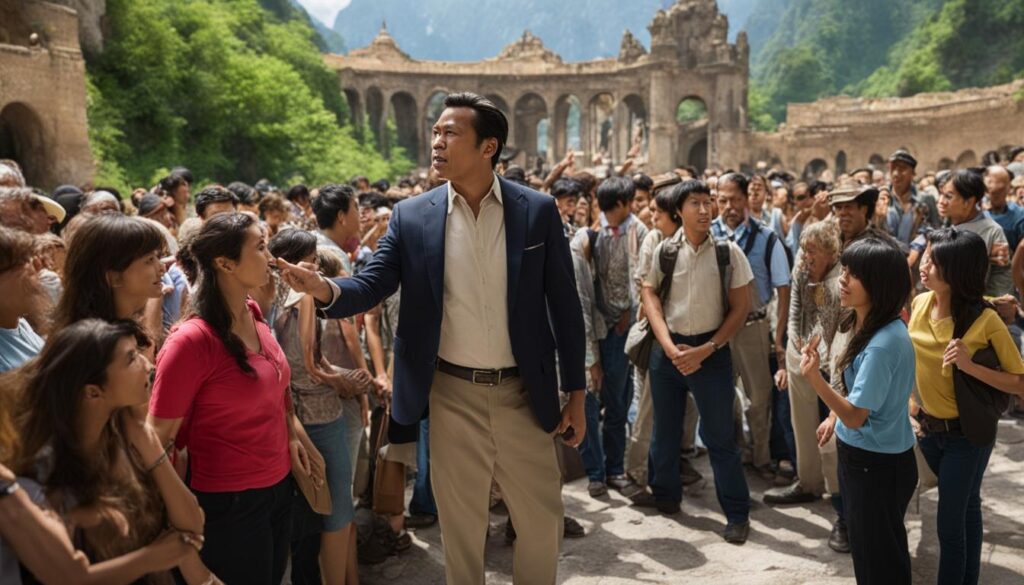
Respecting Cultures: The Ethical Traveler’s Guide
Traveling to new destinations offers an exciting opportunity to immerse yourself in different cultures, but it’s crucial to be a responsible and ethical traveler. Respecting the customs, traditions, and beliefs of the local communities you visit not only ensures a positive and authentic experience but also helps to preserve and protect their cultural heritage for future generations.
When interacting with locals, it’s important to be aware of cultural etiquette and appropriate behavior. Take the time to learn about the customs and traditions of the destination you are visiting. Respect local dress codes, language norms, and social norms. By doing so, you show your appreciation for their way of life and foster mutual respect and understanding.
One of the key aspects of respecting cultures is embracing an open mind and curiosity. Be willing to learn from the locals and engage in meaningful conversations. Ask questions respectfully and show genuine interest in their stories, history, and cultural practices. This not only enriches your travel experience but also fosters a spirit of cultural exchange and appreciation.
As part of ethical travel, it’s also important to be mindful of your impact on local communities and the environment. Support local businesses, artisans, and craftsmen by purchasing souvenirs and goods that are made locally. Opt for sustainable and responsible tourism practices, such as choosing eco-friendly accommodations and participating in community-based tourism initiatives. By doing so, you contribute to the preservation of cultural heritage and the economic well-being of the local people.
Respecting cultures while traveling not only deepens your connection with the places you visit but also helps to create a more inclusive and harmonious global community. By embracing cultural diversity and encouraging ethical travel practices, we can foster a world where every traveler contributes positively to the preservation and celebration of different cultures.
Communication: Overcoming Language Barriers
When traveling to foreign countries, language barriers can often pose challenges for effective communication. However, with the right strategies and tools, you can overcome these barriers and ensure a smooth and enjoyable travel experience.
One of the most effective ways to communicate in a foreign country is to learn basic phrases in the local language. Simple greetings, thank you, please, and yes/no can go a long way in establishing connections and showing respect to the locals. Additionally, using translation apps can be incredibly helpful in bridging the language gap. With the advancements in technology, there are numerous travel language apps available that can provide instant translations and even help you pronounce unfamiliar words correctly.
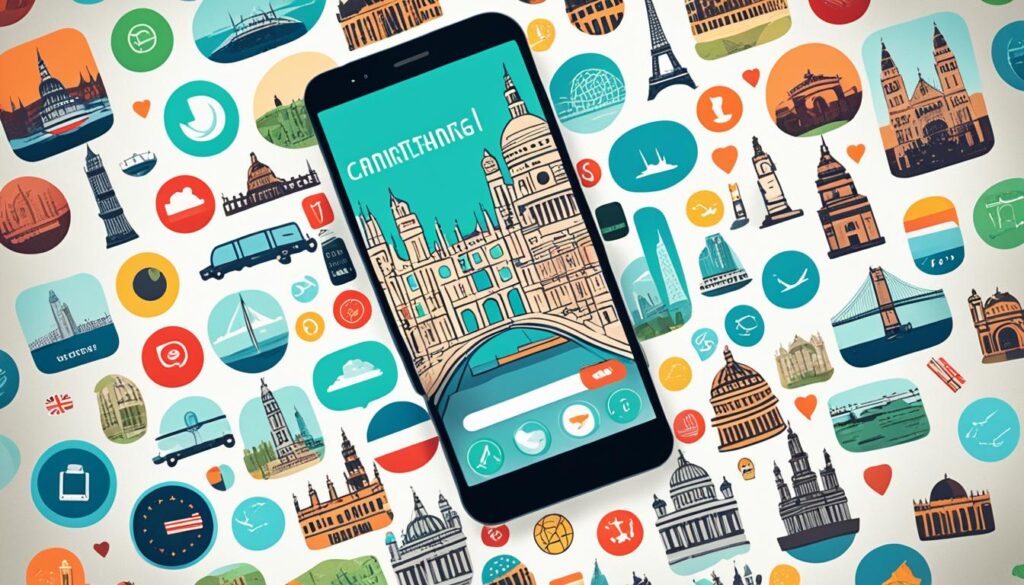
Interacting with locals can also enhance your communication experience. Despite the language barrier, non-verbal communication and gestures can be surprisingly effective in conveying messages. A smile, a nod, or a simple thumbs-up can express gratitude or agreement without the need for words. Moreover, don’t hesitate to use visual aids such as maps, diagrams, or pictures to help get your message across.
Traveling is the perfect opportunity to embrace the beauty of different languages and cultures. With a little effort, you can break down language barriers and create meaningful connections with people from around the world.
Maximizing Your Travel Experience
When it comes to traveling, it’s not just about visiting new places—it’s about immersing yourself in the local traditions and truly embracing the culture. By engaging with the local community and participating in cultural activities, you can enhance your travel experience and create memories that last a lifetime.
Immersing Yourself in Local Traditions
One of the best ways to maximize your travel experience is to immerse yourself in the local traditions. Take the time to learn about the customs, rituals, and practices of the destination you are visiting. Whether it’s joining in on a traditional dance, trying local cuisine, or participating in a religious ceremony, embracing the traditions of the locals will allow you to gain a deeper understanding of their way of life.
Don’t be afraid to step out of your comfort zone and engage with the local community. Strike up conversations with the locals, ask questions, and listen to their stories. By showing genuine interest and respect, you’ll be surprised at how much you can learn and how welcoming the locals can be.
Documenting Your Adventures for Lifelong Memories
While immersing yourself in local traditions is important, it’s equally essential to document your adventures along the way. By capturing your experiences through photography, journaling, or other creative means, you can create lifelong memories that you can revisit and share with others.
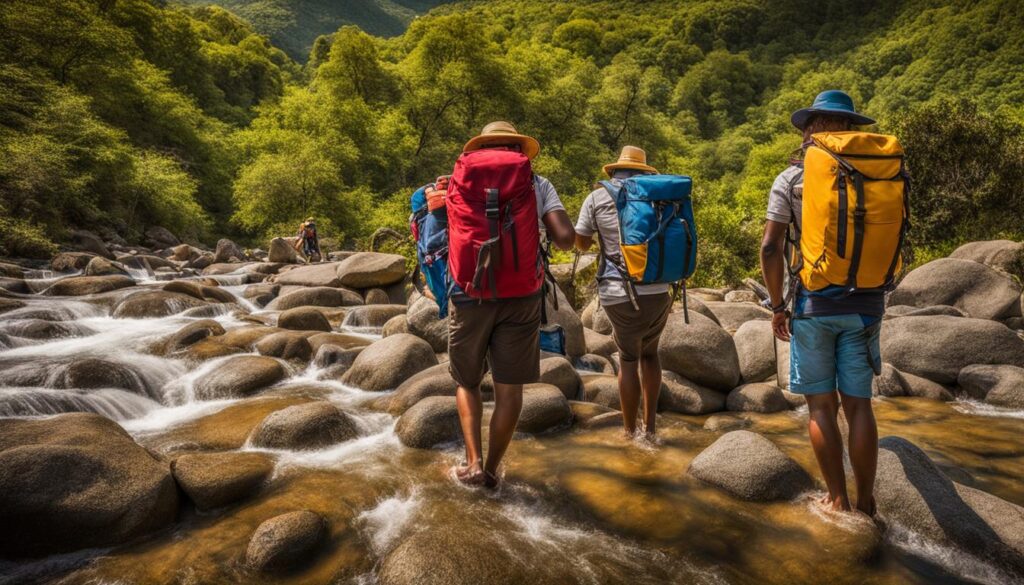
Photography allows you to freeze moments in time, capturing the beauty of the places you visit and the people you meet. Whether you’re a professional photographer or simply using your smartphone, don’t miss the opportunity to capture those breathtaking landscapes, vibrant street scenes, and candid moments.
Journaling is another excellent way to document your adventures. By jotting down your thoughts, feelings, and experiences, you can reflect on your journey and preserve the details that may fade from memory over time. Your journal can become a cherished keepsake that transports you back to your travel experiences whenever you revisit its pages.
Remember, documenting your adventures doesn’t have to be limited to just photography and journaling. Get creative and find other ways to capture the essence of your travels. Perhaps you can collect mementos from each destination, create a scrapbook, or even write a blog to share your stories with others.
Ultimately, by immersing yourself in local traditions and documenting your adventures, you’ll not only maximize your travel experience but also create memories that will stay with you long after your journey ends.
Travel Essentials: What to Carry and What to Leave Behind
When it comes to packing for your trip, choosing the right travel essentials can make all the difference. You want to ensure that you have everything you need for a smooth and enjoyable journey, while also avoiding the burden of carrying unnecessary items. Here are some expert packing tips to help you pack smart and make the most of your travel experience:
1. Create a packing checklist: Before you start packing, make a list of essential items you’ll need on your trip. This will help you stay organized and ensure that you don’t forget anything important.
2. Pack versatile clothing: Choose clothing items that can be mixed and matched easily to create different outfits. This will help you pack light while still having enough options for different occasions and weather conditions.
3. Don’t forget the travel accessories: Remember to pack essential travel accessories like a travel adapter, portable charger, and a universal lock for your luggage. These small yet crucial items can greatly enhance your travel experience.
4. Leave behind the “just in case” items: It can be tempting to pack items that you think you might need but are unlikely to use. Be ruthless and leave behind anything that falls into the “just in case” category. Remember, you can always buy things you need on the road.
5. Pack toiletries wisely: To save space and comply with airline regulations, invest in travel-sized toiletries or refillable travel bottles. This will allow you to carry all your necessary toiletries without weighing down your luggage.
6. Consider the weather and activities: Pack appropriate clothing and gear based on the weather conditions and activities you have planned. Research the destination beforehand to ensure you’re well-prepared for the local climate.
Now, take a look at this helpful table below to see a comprehensive list of travel essentials that you should consider packing:
| Essential Items | Optional Items |
|---|---|
| Passport | Travel pillow |
| Travel insurance documents | Portable speaker |
| Driver’s license | Travel journal |
| Health insurance cards | Snacks |
| Credit/debit cards | Playing cards |
| Cash | Travel guidebook |
| Mobile phone | Umbrella |
| Chargers and cables | Reusable water bottle |
| Medications | Swimwear |
| Toiletries | Travel yoga mat |
| First aid kit | Travel sewing kit |
| Travel-sized laundry detergent | Beach towel |
| Travel adapter | Camera |
| Portable charger | Snorkeling gear |
| Universal lock | Hiking boots |
| Reusable shopping bag | Binoculars |
Remember, the key to successful packing is to strike a balance between carrying the essentials and traveling light. By packing strategically and leaving behind unnecessary items, you’ll have more room in your luggage for souvenirs and a hassle-free travel experience. Happy travels!
Conclusion: The Joy of Travel
Reflecting on The Transformational Power of Travel
Traveling is more than just visiting new places; it has the power to transform us. As we explore different cultures, taste new cuisines, and connect with people from all walks of life, we gain a deeper understanding of the world and ourselves. The experiences we gather and the memories we create shape our perspectives and broaden our horizons. Travel opens our minds, challenges our beliefs, and helps us grow as individuals. It is a powerful force that has the potential to change our lives forever.
Planning Your Next Adventure
There is always another adventure just around the corner, waiting to be discovered. So, don’t let the end of one journey be the end of your travel story. Embrace the joy of exploration and start planning your next adventure with excitement. Whether it’s trekking through breathtaking landscapes, immersing yourself in vibrant city life, or simply lounging on a secluded beach, the possibilities are endless. Dream big, research, and create an itinerary that fulfills your travel dreams. From booking your flights and accommodations to researching local customs and attractions, every step of the planning process is part of the adventure.
Resources and Suggestions for Further Travel Planning
To continue your travel journey with confidence and ease, here are a few resources and suggestions for further travel planning:
- Visit reputable travel websites and blogs for destination guides, insider tips, and itinerary ideas.
- Join travel communities and forums online to connect with like-minded explorers and glean insights from their experiences.
- Consider joining a travel group or booking a guided tour to fully immerse yourself in the culture and history of your chosen destination.
- Explore travel apps that offer valuable tools such as language translation, offline maps, and local recommendations.
- Consult travel agents who specialize in designing personalized itineraries and can offer expert advice based on your preferences.
- Stay curious and open-minded, and remain flexible during your travels. Allow yourself to be surprised and embrace the unexpected.
Remember, the joy of travel lies not only in the destinations but also in the journey itself. It is a continuous discovery of the world and oneself. So, pack your bags, hit the road, and let the transformative power of travel guide you on your next great adventure!

